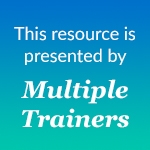

Search Results: needs
-
Learn the two core aspects of NVC: consciousness and tools to express it.
-
Explore self-empathy with an exercise to connect more deeply with your needs.
-
What is self-empathy? Mary Mackenzie leads you on an exploration of self-empathy through an exercise that will show you how you can easily connect more deeply with your needs.
-
Trainer Tip: Notice where you're judging or blaming people for not meeting your needs. Strive instead to notice and name the related feelings and needs longing to be met. Ask a question to check with the other person about what they want and need. This can open up the conversation towards mutually beneficial solutions.
-
Connection requests focus on the quality of connection between people instead of on any particular strategy or solution. While the core motivation for a connection request may be connection with the other person, varied internal states and needs may help guide us toward different types of connection requests. Self-connection and understanding of our motivation in making a connection request can therefore greatly support our capacity for discovering and articulating what specifically we want from the other person that we believe may contribute to connection.
-
Learn to speak NVC using your own voice and increase ease and flow in all your personal and professional conversations. This 7-session telecourse recording with renowned trainer Miki Kashtan is designed to help you integrate NVC into all aspects of your life by gaining fluency in your practice of NVC and by embodying the principles regardless of the words you use. This course is based on intensive practice and coaching with real-life examples from participants’ lives.
-
- Learn how to transform NVC into a tool for systemic awareness and healing
- Examine the influence of difference, and uncover pathways that strengthen its capacity
- Learn to receive and offer feedback on impact in situations fraught with power differences
- Explore specific ways in which NVC systemically supports the full flowering of humanity
- Delve into the dynamics of cultural differences, and discover how NVC can systemically contribute to a liberation perspective
-
NVC trainers discuss intrinsic needs in addiction and its alignment with 12-step programs.
-
In this telecourse recording, you will learn and practice self-awareness skills to fine tune your attention to met needs; savoring feelings of well-being; expressing these feelings to others; and receiving other people's messages of joy, gratitude, inspiration and more!
-
Trainer Tip: The needs we focus on meeting and the strategies we use to meet those needs change over time. Mary shares about the life-serving nature of change.
-
Learn how to move from blame to understanding when needs aren’t met.
-
Giving feedback can be a difficult task, sometimes we try to avoid getting to the point and instead end up spending a long time attempting to communicate. We find there are mostly two types of feedback. The first focuses on what is wrong with the person's behaviour and tends to feel more judgemental whereas the second is values-based feedback, focusing on the needs of the people involved.
-
How can Nonviolent Communication practices support us when we're feeling depressed? Taking a look at some characteristics of depression and how they're linked to unmet needs, we offer some steps to take that help you reconnect with life and others.
-
This exercise explains four stages of the "Need Cycle": Fulfilled, Emerging, Urgent, Satisfying. It asks us to consider, connect and identify needs, feelings and where we are in the Need Cycle. Then it prompts us to remain mindful of the need for sustenance as we move through the cycle, noticing the subtle shifts in your physical sensations and emotions.
-
Certified CNVC Trainer Roxy Manning, Phd, shares three steps on how to reflect on what needs are being served when deciding to implement a strategy.
-
Trainer Tip: Only after we connect to our unmet need can we make sound decisions that will transform our experience. For example, if you feel bored, connect to your unmet needs (eg. need for understanding the relevance, etc) and then look for strategies that will meet them (eg. ask the speaker how this topic relates to our lives).
-
Step into leadership and connection by taking full responsibility while honoring all needs.
-
Trainer Tip: The surest way to enjoy life is to do things that meet your needs. If you don’t enjoy a particular activity, consider the need you hope to meet by doing it. For instance, for each item you want to do consider the needs you're trying to meet. Connect to the joy of that need. Then for each ask: “How would I feel if I delayed finishing this item?”. Consider which items you want to continue, pause, or reprioritize. This can help increase life enjoyment.
-
Trainer tip: NVC focuses on shared human values and needs, and encourages the use of language that increases good will -- plus avoidance of language that contributes to resentment or lowered self-esteem. It emphasizes taking personal responsibility for choices and improving the quality of relationships as a primary goal. For today, focus on making observations without moralistic judgment in at least two of your interactions.
-
Inbal answers a parent's question about praise and offers a perspective on how praise translates into the NVC framework.

Quick Links
Subscription Preferences
Stay In Touch!
Looking for ways to keep up with NVC Academy news, get special offers, free resources, or words of inspiration? Here are five ways to stay engaged:



















